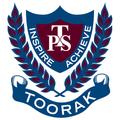School Curriculum

Toorak Primary School provides a comprehensive curriculum based on the Victorian Curriculum.
The Victorian Curriculum covers all students and embodies the school’s aims, values and principles. Its breadth includes the following Learning Areas, which are taught as disciplines, and capabilities which transcend all learning areas.
Learning Areas
• English
• Mathematics
• Science
• Technologies
• The Arts: Drama, Music and Visual Arts (all taught by specialist teachers)
• Health & Physical Education (taught by a specialist teacher)
• Civics and Citizenship, Economics and Business, Geography and History
• Languages: French(taught by a specialist teacher)
• Ethical Capabilities
• Intercultural
• Critical and Creative Thinking
• Personal and Social
The Victorian Curriculum is set out as follows:-
- Learning Areas
- General Capabilities
- Cross Curriculum Priorities
- Subject
- Strands
- Content description and Achievement Standard
Our strategic goals focus heavily on ensuring we are providing a curriculum that challenges all learners and is rich in feedback to enable student growth.
The curriculum content for the Victorian Curriculum corresponds to the following year levels:
- Foundation - Prep
- Level 1 - Year 1
- Level 2 - Year 2
- Level 3 - Year 3
- Level 4 - Year 4
- Level 5 - Year 5
- Level 6 - Year 6
For reporting purposes, standards are documented, which most students are expected to achieve as they work through each particular level. Written reports are provided for parents each term and are available on our Compass Parent Portal.
Literacy
We teach Literacy skills using an explicit and systematic approach. We embed these practices into our daily literacy lessons to provide the best possible environment for all students to develop the ability to read, write and understand the rules that govern the English language.
Our structured reading and writing approach includes:
- Phonological awareness
- Explicit teaching of phonological awareness and phonics
- Automaticity training in the recognition of irregular words/high-frequency words
- Guided practice to improve fluency
- Vocabulary development, including structured morphology
- Explicit teaching of comprehension strategies
Reading and writing instruction are closely linked together in the classroom. Texts and novels aim to develop student background knowledge on a range of topics. These concepts are embedded into writing to help students gain deep understandings. Teachers explicitly teach writing skills and strategies to enable the students to become confident writers. These skills include a focus on sentence structure including simple, compound and complex sentences. From the early years, students learn sentence types (statement, command, question and exclamatory) as well as parts of a sentences and boundary punctuation. These ideas develop through the years with focus on specific sentence structures, subordinate and independent clauses, conjunctions, appositives and sentence combining. They also learn to expand sentences using adverbial adjectival and prepositional phrases. Tasks aim to build student vocabulary and assist them in planning, drafting, revising, editing and publishing a variety of texts.
Spelling/ Phonics:
Spelling is explicitly taught with activities involving students spelling, blending and segmenting words as well as dictation exercises. Students are also taught sight words and different syllable types to assist with spelling more complex words. From Foundation to Year 2, students are involved in daily Sounds-Write lessons. Sounds-Write is a highly structured, systematic synthetic phonics program which teaches students how the alphabetic code works. Fundamentally, it teaches students the key decoding skills required to be effective readers and spellers. From Year Three to Six students follow the Spelling Mastery program which involves morphology (prefixes, suffixes) and the spelling rules that govern them.
English as an Additional Language
English as an Additional Language (EAL) students come from a background where English is not their first language. This includes newly or recently arrived students from overseas, languages other than English background and students born in Australia. A student is defined as being from a language background other than English, if either the student, mother or father speaks another language beside English. Approximately 25% of the families at Toorak Primary School are from non-English speaking backgrounds.
EAL Curriculum
EAL learners spend the majority of their school time with their classroom teacher Therefore, the main responsibility for ensuring that EAL learner needs are met will always be the day-to-day responsibility of the classroom teacher. Classroom teachers are supported by the EAL leader. EAL learners needs are met is through planning and implementing a teaching program that caters to the EAL learner’s particular needs.
There is a particular emphasis on speaking and listening and the teaching of vocabulary. Students are assessed on arrival and may be placed on the EAL curriculum post assessment. Once a student has achieved all stages on the EAL Continuum (Years P-2 A Stages)(Years 3-6 B Stages) the student may then move onto the Victorian Curriculum.
Mathematics
At Toorak Primary School, we take an engaging and comprehensive approach to teaching mathematics. With dedicated one-hour daily lessons, we strive to foster a deep understanding of mathematical concepts for our students. Our teaching philosophy is centred around explicit instruction through the gradual release of responsibility, checking for student understanding at every step. Teachers respond to the needs of their students by providing opportunities for whole class, small group instruction or individual feedback if misconceptions arise throughout daily lessons.
Science of Learning: In line with current research, we implement daily reviews for 10-15 minutes at the beginning of each lesson to promote retrieval practice, reinforcing previously learned material. This not only solidifies knowledge but also enhances long-term retention.
Concrete-Pictorial-Abstract: Where possible, new concepts are introduced through the use of concrete materials. These items can be physically handled, enabling children to explore different mathematical concepts in more depth. These are sometimes referred to as maths manipulatives and can include ordinary household items such as popsticks, straws or dice.
Pre-teaching vocabulary: Our commitment to building strong maths vocabulary equips students with the language to express their mathematical thoughts and ideas effectively. Classrooms contain posters and student glossaries of key words and definitions which can be referred to throughout a unit of work.
The Four Proficiencies: At Toorak Primary School, our teachers strive to ensure students excel in the four proficiencies of mathematics: Understanding, Fluency, Reasoning, and Problem Solving.
- Understanding: We emphasise deep understanding of mathematical concepts, allowing students to grasp the 'why' behind mathematical procedures.
- Fluency: Our daily one-hour lessons promote fluency in mathematical operations, helping students build the necessary skills and speed in calculations.
- Reasoning: We encourage critical thinking and reasoning, enabling students to apply mathematical principles to real-world problems and make informed decisions. We encourage students to explain their thinking and justify their answer through
- Problem Solving: Our curriculum is designed to nurture problem-solving skills, preparing students to tackle complex challenges with confidence.
Digital Technologies: We integrate digital technologies to enhance learning experiences and boost engagement. Students participate in ‘Numbots’ and ‘Timestables Rockstars’ to build their fluency and automaticity in counting, as well as their knowledge of addition, subtraction, multiplication and division facts.
Assessment: Teachers utilise a range of assessment tools to gather student data which supports planning and intervention. We use regular, low stakes assessments such as quizzes and games which help to identify misconceptions and gaps in student understanding.
Social and Emotional Learning
Respectful Relationships
Respectful Relationships education is a core component of the Victorian Curriculum from foundation to year 12. It is all about embedding a culture of respect and equality across the entire school community.
Respectful Relationships promotes respect and gender equality and helps students learn how to build healthy relationships. It prepares students to face challenges by developing problem-solving skills and building resilience and confidence.
Zones of Regulation
At Toorak Primary School, we explicitly teach the Zones of Regulation throughout the whole school. We want to teach all of our children good coping and regulation strategies so they can help themselves when they experience anxiety and stress. In the classroom, sometimes children panic when faced with a tricky learning problem or challenge. By teaching them how to cope with these feelings support them in learning challenges and build better resilience so they don’t give up so easily when faced with difficulty. We want children at Toorak Primary School to grow into successful teenagers then adults.
Specialist Programs
Specialist programs are provided in – Visual Arts , French, Physical Education, Music and Performing Arts.
Visual Arts
A visual arts/technology program is offered from Prep to Year 6. Specialist lessons are provided for all students. Art smocks must be worn. An old shirt with sleeves cut to size makes an ideal art smock.
Languages Other Than English (LOTE)
Students throughout the school participate in a language program that involves exposure to, and the development of, speaking and listening and reading and writing skills in the French language. Cultural awareness activities are also incorporated into the French LOTE program to foster an appreciation for, and an understanding of, diversity between other cultures and their own.
Performing Arts
A qualified music teacher provides an extensive performing arts/music program for students at all levels. Opportunities are provided for a range of musical experiences such as drama, dance, school choir, strings and performances including a biennial Musical.
Physical Education (PE) and Sport
All students participate in an extensive physical education program. P.E lessons are provided by a PE teacher and Foundation classes also participate in a Perceptual Motor Program. Grade 3 to 6 classes are involved in interschool sport, cross-country, athletics and swimming carnivals. Students need to wear running shoes on PE days.
A comprehensive swimming program is provided for students in Foundation to Grade 4. Programs are designed to enable every child to learn to improve their swimming skills. Students are taught water safety skills and water confidence. TPS also offer interschool snow sports for Foundation through to grade 6.
ICT
We recognise the importance of providing opportunities for students to access the latest Information and Communication Technologies. Networked computers and iPads are provided in Foundation to Grade 2 classrooms whilst Grade 3 to Grade 6 students are required to purchase their own netbook. Computers are utilised across all learning areas. Supervised internet access is provided to all students.
German Program
We offer a German immersion program, 100 minutes per week for native German speakers. Click here for more information.
